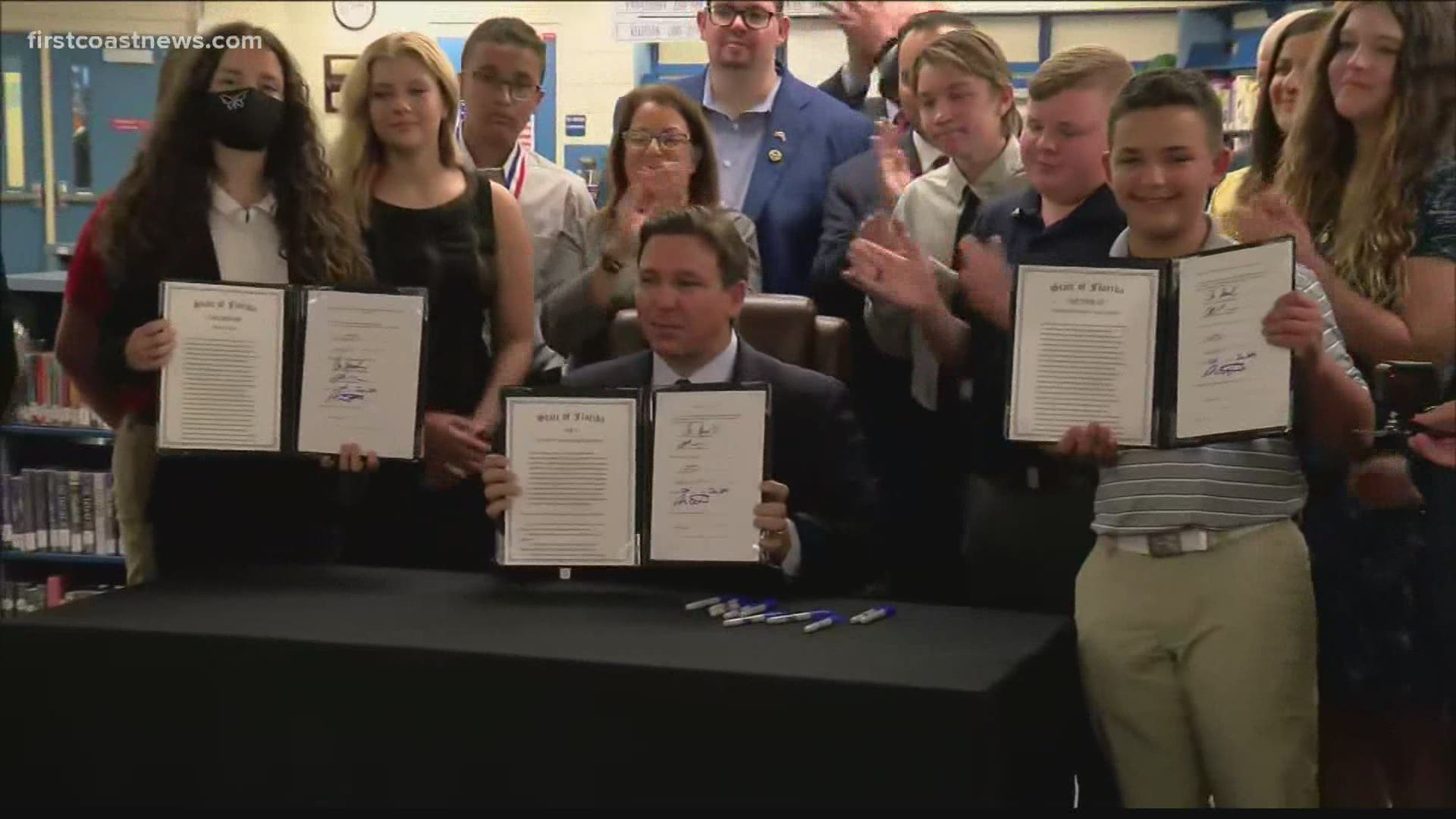JACKSONVILLE, Fla. — Florida Gov. Ron DeSantis signed three education bills Tuesday at a Fort Myers middle school, saying Florida will become the nation's leaders in civics education.
HB 5, SB 1108 and HB 233 will collectively strengthen civics instruction and civics literacy education in Florida, including students as young as kindergarten and up through postsecondary public institutions, the governor said at a news conference and ceremonial bill signing.
Scroll down for a summary of what each bill entails.
“The sad reality is that only two in five Americans can correctly name the three branches of government, and more than a third of Americans cannot name any of the rights guaranteed by the First Amendment," DeSantis said. "It is abundantly clear that we need to do a much better job of educating our students in civics to prepare them for the rest of their lives."
The governor also addressed the need to keep certain types of instruction out of Florida's classrooms. Earlier this year, the governor promised to keep critical race theory out of Florida curriculums, a move the Florida State Board of Education voted in favor of earlier this month.
In March, when DeSantis unveiled the $106 million plan to increase civics education in Florida schools, he lambasted the intellectual movement started by legal scholars as a way to examine inequalities among marginalized groups.
"Let me be clear: There is no room for things like critical race theory," DeSantis said in March. "Teaching kids to hate their country and to hate each other is not worth one red cent of taxpayer money."
HB 5 includes a requirement for high school students to discuss "political ideologies that conflict with the principles of freedom and democracy essential to the founding principles of the United States, such as communism and totalitarianism.
DeSantis was joined Tuesday by people who fled their home countries to seek refuge in the United States, fleeing from places like Venezuela, Cuba and Nicaragua. Their presence highlighted the need to educate Florida students on what one speaker referred to as "the crimes of communism."
"This education is especially crucial for America's youth during their formative years, so we applaud Florida for ensuring their students will receive this education," said Andrew Bremberg, President and CEO of the Victims of Communism Memorial Foundation. "Only 63% of Gen Z and Millennials believe the Declaration of Independence better 'guarantees freedom and equality' over the Communist Manifesto, and 40% of Americans today have a favorable view of socialism."
Here are summaries of what each bill provides, sent in a news release from the governor's administration:
House Bill 5: Civic Education Curriculum
House Bill 5 requires the Florida Department of Education to create an integrated K-12 civic education curriculum that includes an understanding of citizens' shared rights and responsibilities under the Constitution and Bill of Rights. It further expands required instruction in high school to include a comparative discussion of political ideologies that conflict with the principles of freedom and democracy essential to the founding principles of the United States, such as communism and totalitarianism. This bill also provides a library of "Portraits in Patriotism" based on personal stories of diverse individuals who demonstrate civic minded qualities, including those who have moved to this country after being persecuted in nations like Cuba and Venezuela..
Senate Bill 1108: Education
Senate Bill 1108 requires state college and state university students to take both a civic literacy course and a civic literacy assessment as a graduation requirement, bridging civics education between our high schools and postsecondary institutions.
The bill further requires high school students to take a civic literacy assessment that has no high stakes consequences. If a high school student passes the test, that student is exempted from the postsecondary test requirement.
The bill also expands the character development curriculum for high school juniors and seniors to include instructions on how to register to vote.
House Bill 233: Postsecondary Education
House Bill 233 requires state colleges and universities to conduct annual assessments of the viewpoint diversity and intellectual freedom at their institutions to ensure that Florida’s postsecondary students will be shown diverse ideas and opinions, including those that they may disagree with or find uncomfortable.

